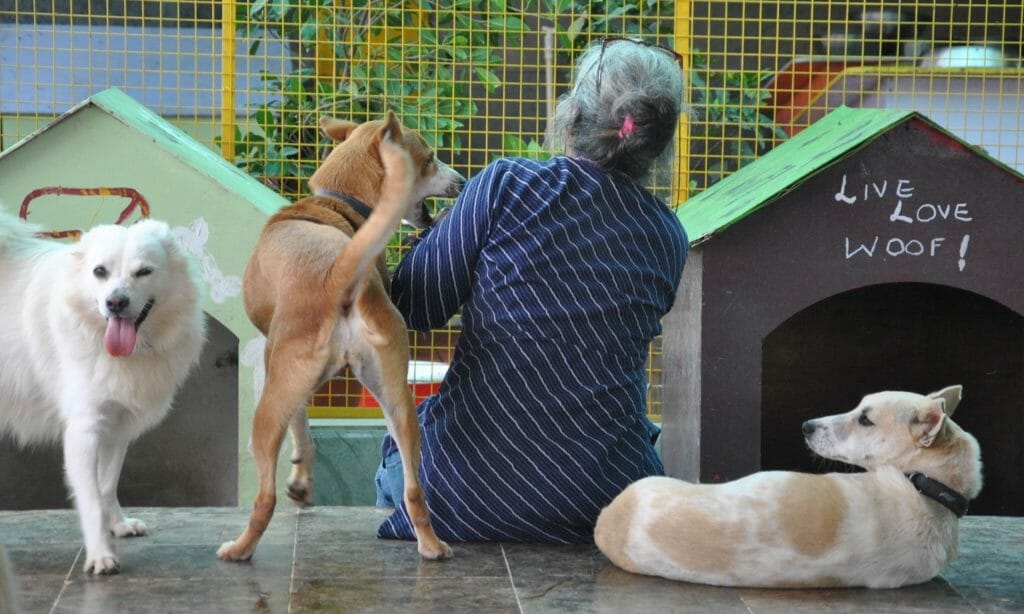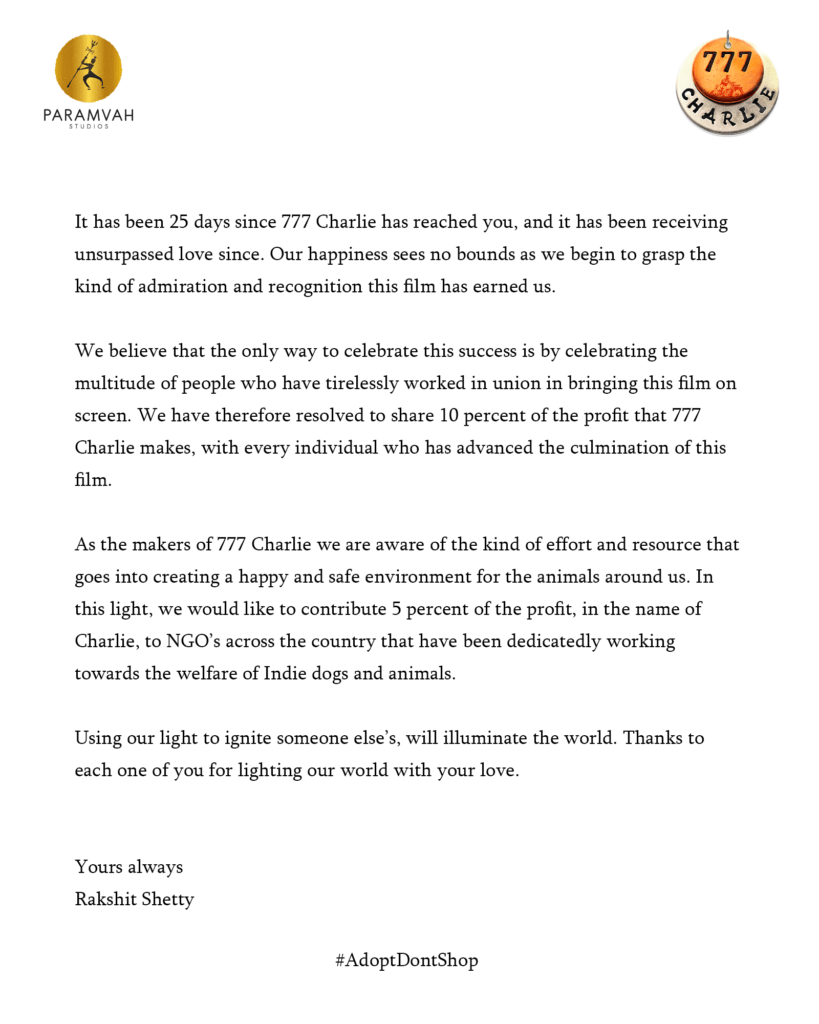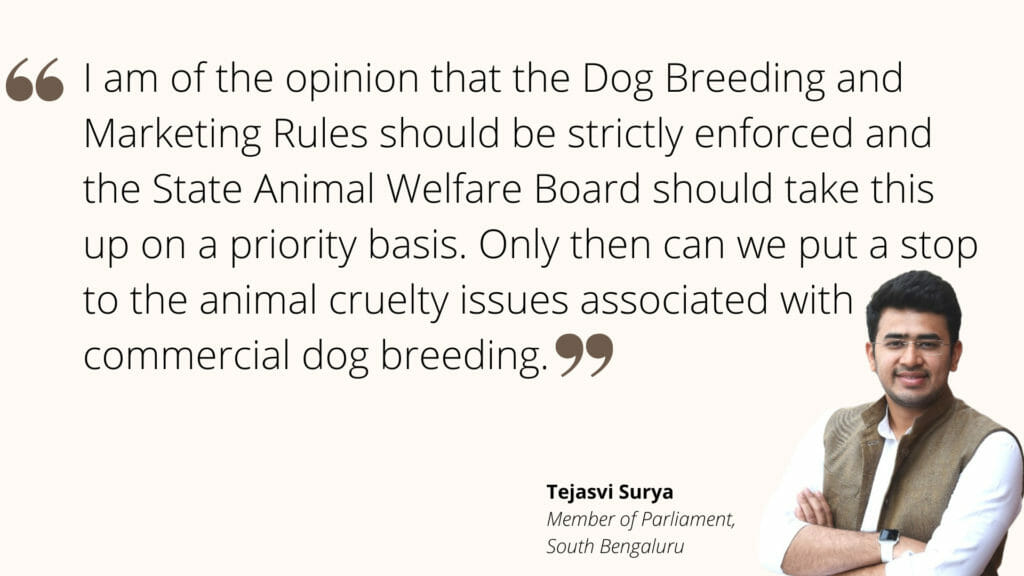The recent Kannada blockbuster 777 Charlie attempts to tell a story that can change hearts and perceptions about dogs; Indie dogs in particular. The film, directed by Kiranraj K is the story of Dharma, a man who suffers from terrible trauma having lost his entire family in a road accident. Dharma, played by Rakshit Shetty, becomes a recluse and attaches no significance to his life till a rambunctious, pesky pup shows up at his doorstep his life upside down for good. Dharma takes in the abandoned pup Charlie. In turn, Charlie gives him a sense of purpose in life.
Making hearts melt: What 777 Charlie does differently
There was a real Charlie and he was an Indie. Director Kiranraj K is an avid animal lover and has had Indie dogs all his life. One of his indie dogs, Charlie, was diagnosed with a rare form of cancer called Squamous Cell Carcinoma. Charlie was moved to Bengaluru’s Charlie’s Animal Rescue Centre (CARE) for treatment, where he was convalescing.
It was during the pandemic and after the passing of Charlie that Kiranraj, struck by grief, launched a movie project 777 Charlie. While working on the script for 777 Charlie, Kiranraj relied on CARE’s inputs—on pet abandonment, trauma care, inbreeding, cruelty and pet adoptions—which have been woven into the film’s narrative.
The movie that was released is a tribute to Kiranraj’s Indie dog. “The reel Charlie was to be an Indie given Kiranraj’s love for Indie dogs, however, it would have been daunting for a single dog to perform over 400 tasks. With no two Indie dogs looking the same, they (the filmmakers) had no choice, but to bring in four Labradors to the set,” shares Sudha Narayanan, the Founder-Trustee of CARE.

The ‘Adopt-Don’t-Shop’ narrative
In India, the dog breeding business is a lucrative business. Dogs are treated like commodities and used for mass production of pups. With the Labradors playing Indie Charlie’s role, it was imperative that the director had to subtly weave in the “Adopt-Don’t-Shop’ message for the audience.
“Charlie was never sold or bought in the film and that is the message the audience should take away. In real life too, both Rakshit and Kiranraj have adopted their reel Charlies,” says Sudha. In the film, the protagonist Dharma ends up adopting Charlie off the street. “My intention was to tell people to adopt an Indie or any abandoned dog. Charlie the dog lands up in the street and is exposed to the elements, but somehow survives these vagaries. I request you to give needy dogs a home,” appeals Kiranraj.
Read more: Animal Birth Control for street dog management: It’s time for an upgrade
A kind, compassionate and responsible team
According to Sudha, every single person on set was kind to the animals. Kiranraj says that his team feeds many Indies, and has passively adopted some dogs at CARE. Passive adoption is when animals remain in the shelter, but their upkeep is sponsored by a donor.
Actor Rakshit Shetty is a dog lover. Actor Raj B Shetty has around 7-8 indies. Kiran, Rakshit, and actor Sangita Sringeri have also passively adopted dogs from the CARE shelter. Child actor Adrika likes to spend time with animals. Lavya, who plays Adrika’s mother, a dog hater in the film, adopted an abandoned Indie dog off the roads in the Miniforest Park area—she named him Charlie.
Recently, Rakshit’s Paramvah Studios, which produced 777 Charlie, has promised to contribute 5% of the film’s profits to select NGOs across India which work for animal welfare.

Puppy mills and breeding factories present in Bengaluru
Karnataka, including Bengaluru, has several unlicensed backyard breeders. These breeders run puppy mills with female breed dogs who are bred indiscriminately and kept in terrible conditions. They indulge in continuous inbreeding – this often affects the health of the puppies. In the film, Charlie’s character is that of a backyard breeder discard.

As a pup, Charlie is tortured by the backyard breeder and finally abandoned. Charlie’s disconsolate past subsequently comes to Dharma’s attention. The breeder is eventually arrested and the police confiscate the dogs in the puppy mill. Bengaluru’s animal welfare activists would surely pray for such outcomes. In reality, there are no checks and balances for dog breeders.
Dog Breeding and Marketing (DBM) rules 2017 and Pet Shop rules 2018 lay out the broad structure, regulations and controls to ensure responsible breeding and avoid cruelty. Breeders must possess a license to breed and sell, dogs cannot be displayed for immediate sale, and pups must be a minimum of two months old. Protection to the dam, medical testing, proper care and the kennel facilities are clearly outlined. It implies that even home breeding comes under the purview of the above act.
Why are so many dogs abandoned?
Animal shelters such as CUPA and CARE are always full of abandoned breed dogs. People buy a dog and many a time are unable to honour the responsibility of seeing the dog through his or her lifetime. As a result of which they end up being given up to shelters or abandoned on the streets. Sudha says, “For every dog that is purchased, an abandoned shelter dog is denied a home.”
Read more: Puppy love ends as COVID lockdown lifts
Demand for labradors on the rise after 777 Charlie’s release
Along with the positive reviews, the film also got criticism that it has given way to the increase in demand for labrador pups, specifically in Bengaluru.
Kiranraj is saddened to see people interested in paying money to buy a pedigree dog, “This was not at all the objective.” He explains the film conveys that local indies and abandoned dogs like Charlie should be adopted, “In fact, in the end, the protagonist even says that there are many Charlies waiting in the street for a loving home. We have used a breed like Charlie’s just to talk about breeding and its perils; it doesn’t mean that only Charlie can give that love and bonding. All dogs can.”
Raj Shetty wrote on Facebook, “Love doesn’t have a breed. Let’s love and let’s own an indie,” signing off as a “proud father of 8 indies.’’
“For every dog that is purchased, an abandoned shelter dog is denied a home.”
Sudha Narayanan
After all, as Milan Kundera, the Czech writer says, “Dogs are our link to paradise.” Even if not literally but figuratively dogs could be our link to paradise. Any of us who has had the experience of truly loving and living with a dog has indeed hit paradise, at some point. The relationship that dogs and humans share is unconditional and pure, which brings out nothing but the best in humans.
Dogs make it so easy to fulfil a human’s purpose in life—to become better versions of themselves. 777 Charlie has made an excellent effort to showcase that relationship on screen and we are sure movie watchers will connect and empathise with that.
Very good and informative article. Only a genuine lover of dogs especially streeties can express such good thoughts. Keep it up.Harini